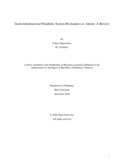Gastrointestinal and metabolic system biomarkers in autism: a review
Abstract
Autism spectrum disorders (ASDs) are heterogeneous and complex disorders that are growing dramatically in children. Currently, there are no objective methods to assess the disorder. However, subjective behavior can develop an objective understanding of the measurement of autism. Therefore, the objective of this study was to review various gastrointestinal (GI) and metabolic system biomarkers in autism. Different articles containing probable relevant biomarkers of autism were reviewed. All the case-control studies showed that β-endorphin, Casomorphine, Coproporphyrin, Dermorphin, Desmorphin along with vasoactive intestinal peptide levels of the GI system were increasing in the autistic subjects. Furthermore, the decreasing levels of Dipeptidyl peptidase IV were observed by researchers leading autism. Moreover, some oxidative stress biomarkers of the metabolic system such as glutathione-reduced/oxidized, methionine, cysteine, urine 8-OHdG, plasma F2t-isoprostanes and also transferrin with their abnormal levels that caused autism were also defined by the researchers.

